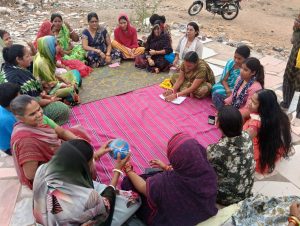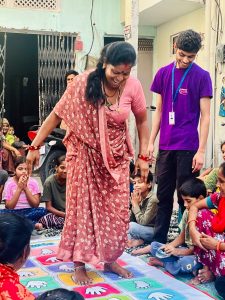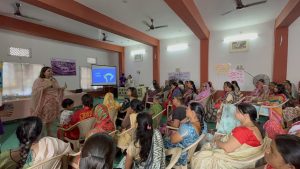
29 Jul Taking Mental Well-Being to the Margins: One Chaupal at a Time
Mental health gets discussed – in therapists’ offices, in seminars and workshops, on social media and in close circles of people who are well-versed with the terms and technologies. At this point, it might counterintuitively appear that mental wellbeing is getting limited to the urban, upper-class, upper-caste people. While we all do realise that mental well-being is as fundamental as the right to life itself, and it affects the lowest strata of the society as much, if not more, we are yet to take it to the margins.
However, things are changing. A group of three young people have started these conversations in the gullies of Udaipur city with women. These young people- Mohit, Rajni and Bharati come from the margins of the city where access to health service is limited and for women, mental well-being often ranks far below the never-ending list of responsibilities — household chores, care work, jobs, and the daily hustle for survival.
The trio noticed this gap and decided to act.
“The way mental health is usually spoken about wouldn’t have worked here,” Rajni explains. “It’s hidden, stigmatised, and often ignored. So we had to get creative to open it up.”
They created a safe space that was physically and emotionally accessible, just around the corner of their homes, right where the women live. They called it “Man ki Chaupal” i.e., a gathering of the heart and mind.
 Under the shade of trees or in narrow lanes, on brightly coloured rugs spread over uneven stone floors, women sit in circles, laugh, play, and open up. Games are central to these sessions, the ones that make everyone move, laugh, and participate. In one game, a ball is passed from person to person, and whoever catches it answers a light prompt — “When did you last laugh out loud?” or “What makes you feel free?” Another game uses mats printed with hand and foot symbols arranged in grids where participants must jump forward, aligning their hands and feet correctly on the symbols. As they laugh and stumble and cheer each other on, something profound unfolds. As the body opens, so does the mind.
Under the shade of trees or in narrow lanes, on brightly coloured rugs spread over uneven stone floors, women sit in circles, laugh, play, and open up. Games are central to these sessions, the ones that make everyone move, laugh, and participate. In one game, a ball is passed from person to person, and whoever catches it answers a light prompt — “When did you last laugh out loud?” or “What makes you feel free?” Another game uses mats printed with hand and foot symbols arranged in grids where participants must jump forward, aligning their hands and feet correctly on the symbols. As they laugh and stumble and cheer each other on, something profound unfolds. As the body opens, so does the mind.
Each session includes music, storytelling, and meditation, followed by intimate sharing circles. The women participating in these sessions talk about how they’ve felt in their homes, what stresses them out, and what kind of support they wish they had. These embodied, joyful experiences make it easier to speak, to feel seen, and to claim a sense of ownership over the space — and their well-being.
“Women enjoy these sessions,” says Mohit. “Even the ones who were hesitant at first now look forward to them every week.”
Bharati adds, “Earlier, many women didn’t know that their physical health issues were connected to how they felt emotionally. Now they understand the connection between the two.”
 45-year old Sangeeta (name changed) who is part of a self-help group, recalls that it is the first time since her childhood that she got to jump around and play a game. Another 60 year old woman, Mahima, shared that she never thought of her mental-wellbeing (or Mansik Khushhali, as they call it) before these sessions. Preeti, 29, shares that these sessions make her feel she is not alone and there are other women who are there for her. This sense of community among women is just one of the many impacts that Man ki Chaupal has had on people. Embodied activities activate non-verbal pathways of expression, allowing individuals to process emotions that are difficult to articulate. By engaging the body through movement and play, such practices can bypass stigma and cognitive barriers, enabling deeper emotional regulation and connection.
45-year old Sangeeta (name changed) who is part of a self-help group, recalls that it is the first time since her childhood that she got to jump around and play a game. Another 60 year old woman, Mahima, shared that she never thought of her mental-wellbeing (or Mansik Khushhali, as they call it) before these sessions. Preeti, 29, shares that these sessions make her feel she is not alone and there are other women who are there for her. This sense of community among women is just one of the many impacts that Man ki Chaupal has had on people. Embodied activities activate non-verbal pathways of expression, allowing individuals to process emotions that are difficult to articulate. By engaging the body through movement and play, such practices can bypass stigma and cognitive barriers, enabling deeper emotional regulation and connection.
Mohit, Bharati, and Rajni are not mental health professionals. They are fellows with Cities For Youth, a program led by Safetipin in four cities of Rajasthan. Through this initiative, they explored the idea of a city that is created for youth, by youth. Over a year-long fellowship, they built a deeper relationship with the city and their communities, understanding urban systems and social landscape, and learning to work with communities and government alike. The fellowship equipped them with the ability to use digital tools like MySafetipin app, to gather data for systemic change, and run public campaigns. At the end of this year-long journey, they launched Man ki Chaupal in their own neighbourhoods, with continued support from Cities for Youth.
Over the past five months, they have conducted more than 15 sessions with over 250 women from low-income and marginalised communities.. Most of these women come from low-income and marginalized backgrounds. Supported by Sangath in facilitation and Sewa Mandir in outreach. The youth leaders have also started sharing information on free professional mental health services available in the area.
 To mark the conclusion of this inning of their initiative, the team hosted a culminating event, “Man ki Chaupal Utsav”, a vibrant celebration of courage, conversation, and community. The event brought together over 100 women who attended the session and representatives from local civil society organisations who work with grassroots communities on well-being, employment, and access to services. Most moving of all were the women participants themselves, who stood up to share how the Chaupal had changed their lives, some of them speaking publicly for the first time.
To mark the conclusion of this inning of their initiative, the team hosted a culminating event, “Man ki Chaupal Utsav”, a vibrant celebration of courage, conversation, and community. The event brought together over 100 women who attended the session and representatives from local civil society organisations who work with grassroots communities on well-being, employment, and access to services. Most moving of all were the women participants themselves, who stood up to share how the Chaupal had changed their lives, some of them speaking publicly for the first time.
“Even after the Mann Ki Chaupal sessions are over, we have learnt the value of games. We have started making time for each other as we try to gather after a day’s work and play games just like we did during the sessions.”
“My mother-in-law was deeply depressed after my father-in-law passed away. During a Mann Ki Chaupal session, we saw her smile for the first time when she saw other women playing games. Now, we regularly play games at home to cheer her up.”
These are some of the quotes from women who participated at the Man Ki Chaupal Utsav. Their hopeful participation was proof of the fact that the journey is going to continue and the desire within women to play to have leisure in public.
As they look ahead, these young leaders hope to deepen the work and build more sustained engagement with women. They are now exploring partnerships with organisations that can support them in taking Man ki Chaupal further, with more training, resources, and local leadership. The journey has just begun and the gully has become a ground for healing.
For more details and updates on many such projects and Cities for Youth, visit Cities For Youth website and follow us on Instagram @cfy_rajasthan.

